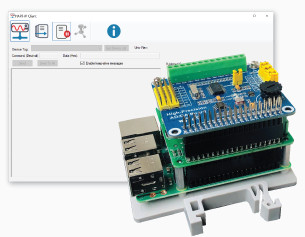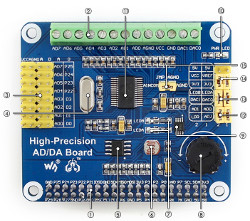Raspberry Pi based dev kit opens up HART-IP field communications
May 5, 2020 — by Eric Brown 6,273 views FieldComm’s “HART-IP Developer Kit” combines a RPi 3B+, a WaveShare High-Precision AD/DA Board, a DLSRKIT PoE HAT, and open source software for exploring the HART-IP field instrumentation comm protocol.
FieldComm’s “HART-IP Developer Kit” combines a RPi 3B+, a WaveShare High-Precision AD/DA Board, a DLSRKIT PoE HAT, and open source software for exploring the HART-IP field instrumentation comm protocol.
The FieldComm Group has announced a HART-IP Developer Kit built around the Raspberry Pi for evaluation, demonstrating, and prototyping devices that use HART-IP, the company’s IP-enabled version of its HART Communication Protocol field communications solution. Some 375 FieldComm Group members representing major suppliers to the process industry are responsible for an installed base of over 40 million HART-enabled field instruments. HART is “by far the most dominant communications protocol used in process manufacturing facilities around the world,” says the company.

HART-IP Developer Kit
The bi-directional HART Communications Protocol, which is an IEC standard, is used for sending and receiving digital information across the 4-20mA analog current loops that connect field instruments with distributed control systems. HART provides two simultaneous communication channels over 4-20mA wiring, which is also used to power the remote I/O field device: the standard analog channel and a digital signal using Frequency Shift Keying that contains device information such as PV, device status, diagnostics, and other values.
HART-IP is a newer protocol that enables the HART Communications Protocol to run over Ethernet and other IP networks. Used primarily for backhaul communications, HART-IP operates with redundant Ethernet media up to Gigabit Ethernet and is compatible with mesh or ring topologies and Power-over-Ethernet (PoE).


HART-IP conceptual diagram (left) and HART-IP Developer Kit networking diagram
(click images to enlarge)
HART-IP avoids the need to convert between analog and digital systems using “time consuming and error-prone data mapping” via Modbus RTU or TCP/IP, says FieldComm. HART-IP can also integrate communications from FieldComm’s WiFi-enabled WirelessHART platform.
— ADVERTISEMENT —
HART-IP Developer Kit details
The HART-IP Developer Kit, which we saw on EENews Embedded, is a three-board kit with a Raspberry Pi 3B+, a PoE board, and Waveshare’s High-Precision AD/DA Board. There is also a “Zebra” enclosure.


HART-IP Developer Kit with Waveshare board housed in Zebra case (left) and PoE board (DSLRKIT Power Over Ethernet PoE HAT)
(click images to enlarge)
The AD/DA board is a Raspberry Pi add-on for analog-to-digital conversion that sells for $30. Other Waveshare RPi add-ons include the Compute Module PoE Board for the Raspberry Pi CM3.
The Waveshare High-Precision AD/DA Board is equipped with a 16-bit DAC, a 24-bit, 8-channel ADC, and AD/DA input/outputs compatible with the Waveshare sensor interface standard. There is also a 10K potentiometer, a crystal, 40-pin GPIO, and other components shown in the detail view below.


Waveshare High-Precision AD/DA Board detail view and legend
(click images to enlarge)
The PoE board is a DSLRKIT Power Over Ethernet PoE HAT, which costs $19 to $21. The IEEE 802.3at Type 2 compliant PoE+ HAT supports a maximum of 20W DC5V 4A power with 1.5KV isolation.
The software that runs on the Raspberry Pi is loaded on a microSD card and includes an Ubuntu Mate Linux image, the HART-IP Server, and FieldComm’s Flow Device Application. There is also a HART-IP Client application that runs on a connected Windows PC and communicates via an Ethernet switch. PuTTY can be used to remote into the Raspberry Pi command line interface.
The GitHub-hosted, open source software includes sample code for the Raspberry PI stack and a demonstration of a HART-IP field device with pre-built EDD and FDI Device Package. There is also a sample FDI Device Package project and EDD source.
FieldComm plans to upgrade the PoE HAT with a replaceable Ethernet module that will support 2-wire Ethernet-APL. Other planned upgrades include the incorporation of FieldComm’s OPC UA-centric Process Automation Device Information Model (PA-DIM), for interoperability with OPC UA applications, as well as support for JSON and XML based DeviceInfo files for use with lightweight IIoT edge gateways.
Further information
The HART-IP Developer Kit is available to FieldComm Group members for $995 and to others for $1,495. More information may be found in the announcement and product page.

So less than $200 in off the shelf materials + open source software = $1000 purchase cost? What am I missing?
The ultimate user guide to Ethernet-APL (Advanced Physical Layer) / Single Pair Ethernet (SPE):
-Justification
-Technical description
-Design & installation
-Integration & architectures
-Application protocols, interoperability, interchangeability
-Commissioning & management
-Control & safety
-Cybersecurity
-Innovation
-Migration
Here:
https://www.linkedin.com/pulse/future-device-io-apl-single-pair-ethernet-jonas-berge/
The ultimate user guide to HART-IP:
-Justification
-Technical description
-Integration & architectures
-Interoperability & interchangeability
-Commissioning & management
-Cybersecurity
-Troubleshooting
-Migration
Here:
https://www.linkedin.com/pulse/implementing-hart-ip-plants-ultimate-user-guide-jonas-berge/